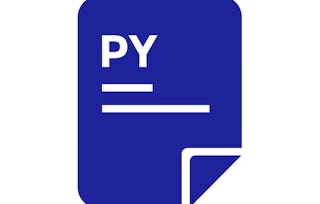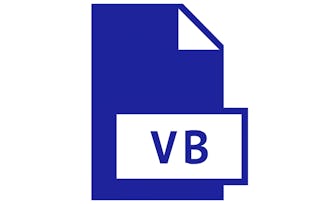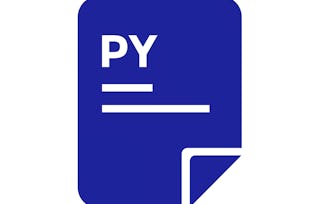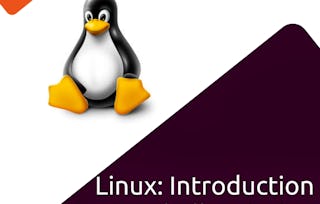This course is the first course in a series that aims to prepare you for a role working as a programmer. In this course, you will be introduced to the five main concepts in procedural programming: user input, console output, variable declaration and assignment, decision branching and iteration. Labs will allow you to apply the material in the lectures in simple computer programs designed to re-enforce the material in the lesson.

Introduction to Python Scripting for DevOps

Introduction to Python Scripting for DevOps
This course is part of Python Scripting for DevOps Specialization

Instructor: Aspen Olmsted
10,403 already enrolled
Included with
142 reviews
Recommended experience
What you'll learn
Develop computer programs that utilize classes and objects to solve business and mathematical problems
Skills you'll gain
Details to know

Add to your LinkedIn profile
17 assignments
See how employees at top companies are mastering in-demand skills

Build your subject-matter expertise
- Learn new concepts from industry experts
- Gain a foundational understanding of a subject or tool
- Develop job-relevant skills with hands-on projects
- Earn a shareable career certificate

There are 4 modules in this course
In this module, we roll up our sleeves and start coding! We will learn to use both IDLE to develop code and also to compile code from the command line. The Python scripts can be written on a Windows, Mac OS or Linux machine and I will show you how to do so. Our first programs will focus on reading input from the keyboard and outputting the results of the program to the console output.
What's included
4 videos3 readings4 assignments2 programming assignments1 discussion prompt
In the second module of this course, we will look at how computers store data during the execution of a program. We will look at storing whole numbers, decimal numbers, boolean values and strings. We will explore how you can convert between different types of variables. Lastly, we will look at how long a variable stays in existence and when it is visible to the pieces of the code.
What's included
6 videos4 readings5 assignments2 programming assignments1 discussion prompt
In the third module of this course, we will learn how to change the flow of a program’s executionSometimesr based on a test. We will look at single tests utilizing if statements in our code. We follow up with multiple tests with the addition of the else clause. Lastly, we look at the case statement as an alternative expression of the flow of the program.
What's included
4 videos3 readings4 assignments1 programming assignment1 discussion prompt
In the fourth module of this course, we learn how to change the flow of our programs by repeating code iteratively. We will start with a look at loops that repeat a fixed number of times. We will follow up with writing loops that continue while a test is positive. Lastly, we will look at how we can modify the flow to immediately break from a loop or jump back to the test condition.
What's included
5 videos3 readings4 assignments2 programming assignments1 discussion prompt
Earn a career certificate
Add this credential to your LinkedIn profile, resume, or CV. Share it on social media and in your performance review.
Instructor

Offered by
Explore more from Software Development
 Status: Free Trial
Status: Free TrialLearnQuest
 Status: Free Trial
Status: Free TrialLearnQuest
 Status: Free Trial
Status: Free TrialLearnQuest
Why people choose Coursera for their career

Felipe M.

Jennifer J.

Larry W.

Chaitanya A.
Learner reviews
- 5 stars
52.11%
- 4 stars
23.23%
- 3 stars
8.45%
- 2 stars
7.74%
- 1 star
8.45%
Showing 3 of 142
Reviewed on Jun 25, 2021
this really helped me understand were i need to go further on
Reviewed on Jan 21, 2022
Wonderful courses worked on with many pratice programs

Open new doors with Coursera Plus
Unlimited access to 10,000+ world-class courses, hands-on projects, and job-ready certificate programs - all included in your subscription
Advance your career with an online degree
Earn a degree from world-class universities - 100% online
Join over 3,400 global companies that choose Coursera for Business
Upskill your employees to excel in the digital economy
Frequently asked questions
To access the course materials, assignments and to earn a Certificate, you will need to purchase the Certificate experience when you enroll in a course. You can try a Free Trial instead, or apply for Financial Aid. The course may offer 'Full Course, No Certificate' instead. This option lets you see all course materials, submit required assessments, and get a final grade. This also means that you will not be able to purchase a Certificate experience.
When you enroll in the course, you get access to all of the courses in the Specialization, and you earn a certificate when you complete the work. Your electronic Certificate will be added to your Accomplishments page - from there, you can print your Certificate or add it to your LinkedIn profile.
Yes. In select learning programs, you can apply for financial aid or a scholarship if you can’t afford the enrollment fee. If fin aid or scholarship is available for your learning program selection, you’ll find a link to apply on the description page.
More questions
Financial aid available,


